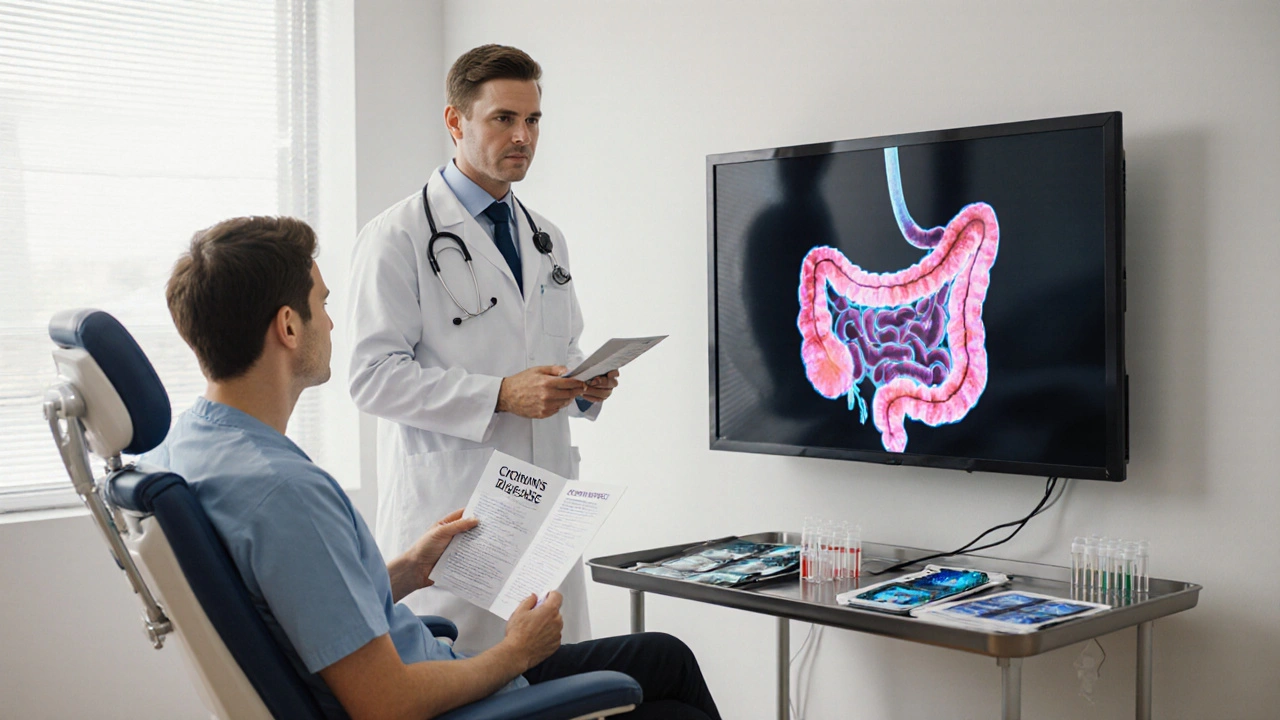How Chronic Diarrhea Signals Crohn's Disease

Crohn's disease is a chronic inflammatory bowel condition that can affect any part of the gastrointestinal tract, from mouth to anus. When you’re dealing with persistent loose stools, you might assume it’s just a stomach bug, but that same chronic diarrhea could be the body’s way of flagging a deeper issue like Crohn’s. Understanding why the two often travel together helps you catch the disease early, avoid complications, and get the right treatment sooner.
Quick Take
- Chronic diarrhea is a common first sign of Crohn’s disease, especially when it lasts longer than four weeks.
- Both conditions share inflammation of the intestinal lining, but Crohn’s can cause additional symptoms like abdominal pain, weight loss, and fever.
- Key diagnostic tools include colonoscopy, stool biomarkers (e.g., fecal calprotectin), and imaging studies.
- Treatment focuses on controlling inflammation with biologics, steroids, or targeted antibiotics, plus diet adjustments.
- If diarrhea persists despite over‑the‑counter remedies, see a gastroenterologist for a full work‑up.
What Exactly Is Chronic Diarrhea?
Chronic diarrhea means watery or loose stools that continue for at least four weeks. It’s not just a one‑off episode; the gut is consistently failing to absorb water, electrolytes, and nutrients. Common culprits include infections, medication side‑effects, and functional disorders, but chronic inflammation-like that seen in Crohn’s-tops the list of serious causes. The stool frequency often exceeds three times a day, and you may notice urgency, cramping, or nighttime trips to the bathroom.
Understanding Crohn's Disease
While it’s part of the broader family of inflammatory bowel disease (IBD), Crohn’s disease has distinct features. It causes patchy, transmural inflammation that can create ulcers, strictures, or fistulas. The disease’s unpredictable pattern means flare‑ups can swing from mild to severe, and remission periods can be lengthy. Unlike ulcerative colitis, which stays confined to the colon’s inner lining, Crohn’s can skip sections and affect the small intestine, colon, or even the upper GI tract.
Why the Two Conditions Often Appear Together
The link boils down to inflammation. When Crohn’s inflames the intestinal wall, it disrupts the absorptive surface, leading to excess fluid in the lumen-hence diarrhea. In many patients, the first noticeable symptom isn’t pain but persistent loose stools. Studies from gastroenterology centers in Australia and the UK report that over 40% of newly diagnosed Crohn’s patients first report chronic diarrhea as their main complaint.

Red Flags: When Diarrhea Might Mean Crohn’s
Not every bout of diarrhea points to Crohn’s. Look for these warning signs that raise suspicion:
- Stools contain blood or mucus.
- Weight loss despite normal or increased food intake.
- Abdominal cramping that eases after a bowel movement.
- Fever, fatigue, or night sweats.
- Persistent symptoms for more than a month without a clear infection.
If two or more of these appear alongside chronic diarrhea, it’s time for a professional evaluation.
How Doctors Diagnose the Connection
Diagnosis is a step‑by‑step process that combines history, lab work, and visual exams. Below is a handy comparison of the most common tools:
| Test | What It Shows | Typical Use |
|---|---|---|
| Colonoscopy | Direct view of colon lining; biopsies for microscopic confirmation. | Gold standard for confirming Crohn’s in the colon. |
| Fecal calprotectin | Elevated levels indicate intestinal inflammation. | Helps differentiate IBD from IBS or infection. |
| MRI Enterography | Images small‑bowel inflammation, strictures, or fistulas. | Preferred when disease may extend beyond colon. |
| Stool culture & parasite panel | Identifies infectious agents. | Rule out bacteria, viruses, parasites before IBD work‑up. |
| Blood tests (CRP, ESR) | Markers of systemic inflammation. | Support diagnosis and monitor disease activity. |
Treatment Options That Target Both Diarrhea and Inflammation
Once Crohn’s is confirmed, the goal shifts to controlling inflammation and restoring normal bowel function. Therapies include:
- Biologics - Agents like infliximab or adalimumab target specific immune pathways, reducing inflammation and often stopping diarrhea.
- Corticosteroids - Short‑term use to tame flare‑ups, but not ideal for long‑term management due to side effects.
- Antibiotics - Certain Crohn’s cases respond to metronidazole or ciprofloxacin, especially when bacterial overgrowth contributes to diarrhea.
- Immunomodulators - Azathioprine or methotrexate help maintain remission.
- Dietary adjustments - Low‑FODMAP, specific carbohydrate diet (SCD), and exclusion of trigger foods can lessen stool frequency.
In practice, many patients need a combo: a biologic for core disease control plus a short steroid burst during flares, all while following a tailored eating plan.
Living with Chronic Diarrhea: Practical Tips
Even with medication, day‑to‑day management matters. Here are some proven strategies:
- Stay hydrated - Aim for at least 2‑3 liters of water daily; add oral rehydration salts if needed.
- Choose low‑residue foods - White rice, bananas, and well‑cooked carrots can ease stool volume.
- Limit caffeine and alcohol - Both can stimulate gut motility.
- Keep a symptom diary - Track foods, stress levels, and medication timing to spot patterns.
- Plan ahead when traveling - Pack extra medication, a compact toilet kit, and a list of nearby medical facilities.
These habits not only reduce discomfort but also give your doctor valuable data for fine‑tuning treatment.

Frequently Asked Questions
Can chronic diarrhea be the only symptom of Crohn’s disease?
Yes. While many patients experience abdominal pain or weight loss, some present with diarrhea alone, especially when the disease affects the colon’s surface without causing deep ulcers.
How long should I wait before seeing a doctor about persistent diarrhea?
If diarrhea lasts more than four weeks, or you notice blood, significant weight loss, or fever, schedule an appointment promptly. Early investigation can prevent complications.
Is a colonoscopy always required to diagnose Crohn’s?
Colonoscopy is the most definitive tool for visualizing colonic inflammation and taking biopsies. However, when disease is suspected in the small intestine, MRI enterography or capsule endoscopy may be used first.
Can diet alone cure Crohn’s‑related diarrhea?
Diet can markedly improve symptoms but does not eradicate the underlying inflammation. It works best alongside medication prescribed by a gastroenterologist.
Are there any over‑the‑counter options that help?
Loperamide can reduce stool frequency for short‑term relief, but it should not replace medical evaluation. Probiotics may assist some patients, but evidence is mixed.
Bottom line: chronic diarrhea isn’t just an annoyance-it can be the first clue that your gut is fighting a deeper battle like Crohn’s disease. Recognizing the link, getting the right tests, and acting on a solid treatment plan can turn a frustrating symptom into a manageable part of your life.






Comments
Ryan Spanier
September 28, 2025 AT 22:02I totally get how scary it can feel when your gut just won’t quit. The fact that chronic diarrhea can be a red flag for Crohn’s is something we should all keep in mind. If you notice it lasting more than a month, it’s worth getting it checked sooner rather than later. Staying hydrated and noting any extra symptoms can really help the doctor pinpoint the issue. Remember, you’re not alone in dealing with this.
Abhinav Moudgil
October 6, 2025 AT 17:58Chronic diarrhea is often dismissed as a minor inconvenience, yet it can be the body’s whisper of deeper inflammation. Recognizing that pattern early can shave months off the diagnostic journey. Pairing stool tests like calprotectin with imaging provides a clearer picture. It’s also crucial to balance medication with diet tweaks for optimal relief.
Miah O'Malley
October 14, 2025 AT 13:53When I think about chronic diarrhea as a symptom, I’m reminded of how the body constantly communicates in subtle, sometimes relentless ways. The gut, after all, is a massive immune organ, and persistent watery stools often signal that its defensive mechanisms are overactive. It’s not merely a nuisance; it’s a symptom screaming for attention, especially when the inflammation spares no part of the intestinal lining. In Crohn’s, that inflammation is transmural, meaning it punches through layers, disrupting absorption and leading to fluid loss. The result is that the stools become loose, frequent, and sometimes even nocturnal, undermining sleep and daily function. Moreover, the presence of blood or mucus adds another layer of urgency, indicating mucosal breaches that require prompt investigation. The diagnostic arsenal-colonoscopy, MRI enterography, and fecal biomarkers-serves to differentiate true inflammatory disease from functional disorders. While a colonoscopy offers a direct visual, it’s the biopsies that seal the diagnosis with histological confirmation. Meanwhile, MRI can reveal hidden small‑bowel involvement that colonoscopy might miss. The therapeutic landscape is equally nuanced; biologics target specific cytokines and have transformed remission rates, but they are not a panacea. Steroids provide rapid control of flare‑ups but carry hefty side‑effects, prompting clinicians to taper quickly. Adjunctive antibiotics can be helpful when bacterial overgrowth compounds the diarrhea. Diet, often underestimated, plays a pivotal role; low‑FODMAP and SCD regimes can reduce osmotic load and calm the gut. Hydration, electrolyte balance, and symptom diaries are the unsung heroes of daily management. In essence, chronic diarrhea isn’t an isolated event-it’s a window into the broader inflammatory milieu of Crohn’s disease, demanding a comprehensive, multidisciplinary response.
Kyle Garrity
October 22, 2025 AT 09:49That deep dive really puts things into perspective. I’ve seen patients who ignored the diarrhea and later faced severe complications. Keeping a log of meals and bathroom trips can be a game‑changer for doctors.
Bradley Allan
October 30, 2025 AT 04:45Wow-talk about a rollercoaster! From “just a bug” to “maybe Crohn’s?” it’s a wild ride. The inflammation part is the real villain here, turning everyday life upside down. And those diagnostic tools? They’re basically the superhero squad. Honestly, it’s crazy how quickly symptoms can escalate if we don’t pay attention.
Joshua Pisueña
November 7, 2025 AT 00:40Spot on, this is why early testing matters. Biologics and diet together can really turn the tide.
Ralph Barcelos de Azevedo
November 14, 2025 AT 20:36We can’t overlook the moral responsibility to spread awareness. Ignoring red flags only fuels the disease’s havoc.
Peter Rupar
November 22, 2025 AT 16:32Honestly, most people think chronic diarrhea is just a minor issue… they dont realize how it can be a sign of serious inflammation. If you dont get checked early you end up with big problems. Its time to take this seriously.
Nikita Shue
November 30, 2025 AT 12:27Exactly, early detection saves a lot of pain. Keep an eye on those extra symptoms.
Heather McCormick
December 8, 2025 AT 08:23Oh sure, because everyone loves having secret bathroom habits, right? And guess what, the “quick fix” migraine meds won’t magically cure gut inflammation. So yeah, get real and see a pro.
Robert Urban
December 16, 2025 AT 04:19I hear the frustration, but let’s keep the tone constructive. Chronic diarrhea is a symptom worth investigating, and sharing personal experiences can help others navigate the healthcare maze. Staying calm and supportive makes the community stronger.
Stephen Wunker
December 24, 2025 AT 00:14Some people claim diet alone solves everything, yet the data shows otherwise. Inflammation needs targeted therapy, not just kale smoothies. So, let’s not oversimplify the issue.
Jhoan Farrell
December 31, 2025 AT 20:10👍 Totally agree with the need for a balanced approach. 🌟 Staying hydrated and having a plan makes a big difference!
Jill Raney
January 8, 2026 AT 16:06It's quite evident that mainstream medicine often hides crucial info about gut health. The elite narratives push pills over lifestyle changes. Question everything.
bill bevilacqua
January 16, 2026 AT 12:01Well... thats... a... lot... of... info... but soooo much of it is just the same old stuff. Like, get checked or dont. Really??!!!
rose rose
January 24, 2026 AT 07:57Stop believing the pharma hype, get your gut checked now.
brandon lee
February 1, 2026 AT 03:53Sounds solid.